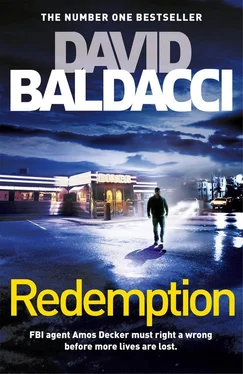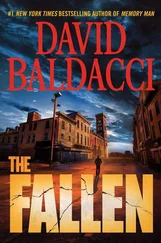“I assume you’d heard about your father before I contacted you?” said Decker, his cup cradled in one big hand.
“I saw the news, yes,” she said.
“As next of kin you’ll probably be called on to make a formal ID. I mean, we know it’s him. It’s just a formality.”
“I would prefer not to. In fact, I would prefer to have nothing to do with it.”
“He is your father.”
“And he also killed four people.”
“He has no other family left. And there’s the matter of burial.”
“They must have protocols for that when someone can’t afford to be buried. Can’t they just cremate him?”
Decker let his gaze wander around the sumptuous interior of the conservatory. “I guess so, for those who can’t pay for it.”
“I know you must think I’m a terrible person, Detective Decker. But the fact is I haven’t seen my father since he went to prison for murdering those people.”
“You never visited him there?”
“Why would I?” She leaned in closer to him. “I have a new life that I worked really hard on. Brad, my husband, doesn’t know anything, really, of my past. I moved from Burlington, cleaned up my act, legally changed my last name, finished college, started working in the financial field, and met my husband. We married, and now I’m a full-time mom and loving it.”
Decker looked around. “What does your husband do? It must pay well.”
“It does. He runs his own high-end job placement platform.”
“High-end?”
“Corporate executives, law and finance, manufacturing, Silicon Valley and all its high-tech positions, lobbying, defense industry, even government positions. He’s been very successful.”
“All that’s way out of my league.”
Mitzi paused to take a sip of her coffee. “So you see, I have no desire to revisit that part of my life. And I really don’t want my family to know about my... struggles. In fact, as far as my husband knows, I’m an orphan. And I guess now I am.”
“I recall that your mother died before your father even went on trial.”
“Thank God. It would have crushed her.”
“Did your father try to contact you, either while he was in prison or after he got out?”
“He wrote me letters when he was in prison. But I never wrote back. After I moved, I didn’t leave a forwarding address.”
“And after he left prison?”
“I had no idea. I thought he was in prison for life.”
“So apparently did everyone else. Including him.”
“Why was he released? The news didn’t say.”
“He was terminally ill. The state didn’t want to foot the bill, apparently.”
She nodded but made no comment.
“And you’re sure he didn’t try to contact you?”
“He’d have no way of knowing where I was. They said someone killed him? Are you sure it wasn’t suicide? You said he was dying.”
“No, couldn’t be suicide. I can’t tell you why, but just trust me on that.”
She sat back. “That’s so bizarre. Who would want to hurt him? It’s been so many years.”
“Some people carry long grudges.”
“You mean the widows? What were their names again?”
“Susan Richards and Rachel Katz.”
“I assume you’ve checked with them.”
“We have.”
“And?”
“And we’re following up.”
“So what do you want with me? On the phone you just said you wanted to talk. I know nothing about the murder of my father.”
“I want to talk to you about the murders he was convicted of.”
“Why?”
“What if your father didn’t commit them?”
Her features sagged. “That’s crazy. Of course he did.”
“And you know for sure how?”
“Like you just said, he was convicted of them. You helped convict him. His fingerprints and DNA were found at the house.”
“Would it surprise you to learn that he came back to Burlington proclaiming his innocence? That he wanted me to prove it?”
“Would it surprise me? No. But it would surprise me if you took it seriously.”
“Maybe it would surprise me too. But he comes back saying he’s innocent and then somebody kills him, on the same day?”
“Like I said, you have two potential suspects.”
“The widows. Did you know they still live in Burlington?”
“Why would I?” she said quickly.
“Well, you said they would be on your list of suspects. They’d sort of have to live in Burlington to make it happen that fast.”
“Oh, well, I guess I assumed.”
“Can I take you through the case again?”
“Do we really have to? I’ve worked hard to put this behind me.”
“It’s really important. And it won’t take long.”
She looked at her watch. “It can’t take too long. My husband and I are going out to dinner later. I’d really prefer that you weren’t here when he arrives. It would take too much explaining.”
“I’ll be as expeditious as I can.”
She sighed, poured another cup of coffee, and sat back, looking at him expectantly.
“Your father went out that day around three, you said.”
“I think that’s right. It’s been a long time.”
“That’s what your statement said.”
She waved her hand dismissively. “Okay then, whatever.”
“They found him very early the next morning walking along a part of town that I would have described back then as being pretty dangerous.”
“Okay?”
“Had he ever been to that part of town before?”
“Not that I was aware.”
“Had you ever been to that part of town?”
She frowned. “What, do you mean when I was looking for drugs to buy? I don’t know. Maybe.”
“He had the opportunity to give us an alibi but never did. He said he was just walking in the rain. Something no one could corroborate.”
She spread her hands but said nothing.
“Before that we came to your house to find him. But he wasn’t there. You said he’d gone out.”
“That’s right.”
“And he never told you where he was going?”
“No. We didn’t talk much back then.”
“Yet you’d come back home to live.”
“I had nowhere else to go. Look, I was a total druggie back then. You know that and I know that. My mother was dying and needed looking after and I couldn’t even provide that.”
“So your father looked after her?”
Gardiner hesitated.
“Your statement didn’t really say one way or the other,” Decker added helpfully.
“We didn’t always see eye to eye, but I have to give credit where credit is due. My dad really cared about Mom. He did what he could. After he lost his job they had almost no money. And her pain was awful.” She involuntarily shuddered.
“She was hooked up to a drip line that night,” noted Decker. “I remember seeing it.”
“Yeah, well, half the time there were no pain meds in that IV bag. They couldn’t afford them. Fucking insurance companies.” She caught herself, put a hand to her mouth, and added, “Sorry, it’s still kind of a sore subject with me.”
“So your mother had insurance?”
“Until my dad got laid off. Then they couldn’t afford to stay on the insurance. And cancer was a preexisting condition. So they couldn’t get another policy anyway.”
“What did he do?”
“He worked every odd job he could and used the money to get what he could from local doctors.”
“But then he was arrested and held until trial. What then?”
“She suffered incredibly,” said Gardiner, her eyes filling with tears. “My mother was in terrible pain and there was nothing I could do about it.”
“Until she passed away?”
“Yes. Fortunately, she died in her sleep soon after.” She shook her head. “She worked so hard her whole life.”
Читать дальше












